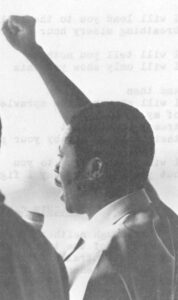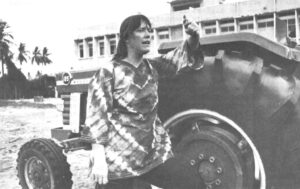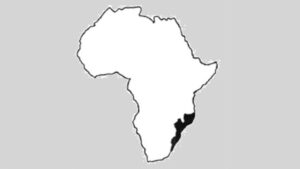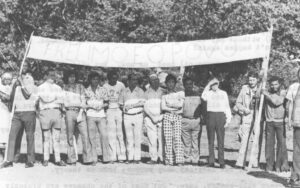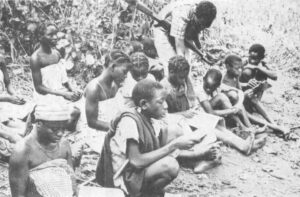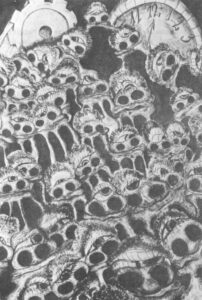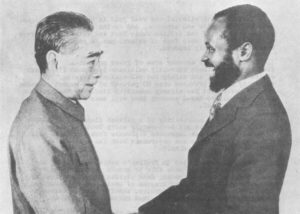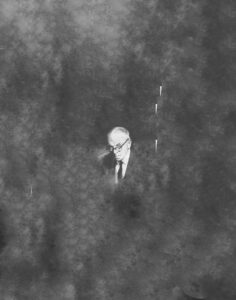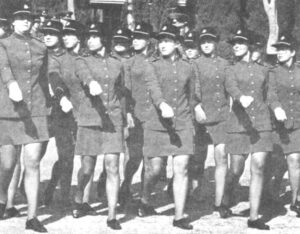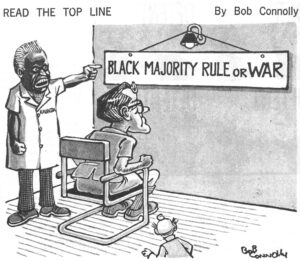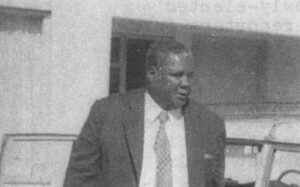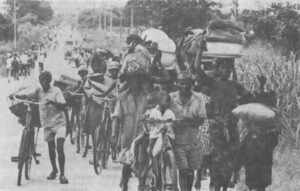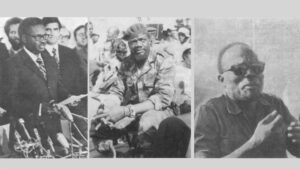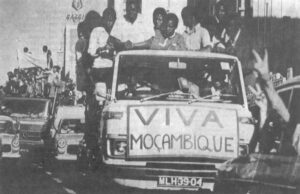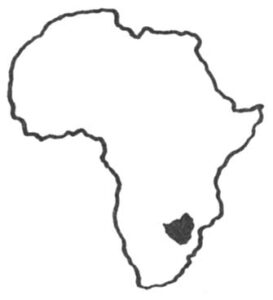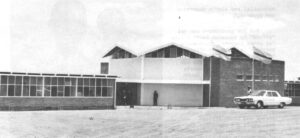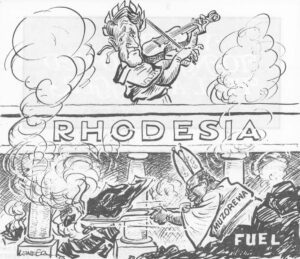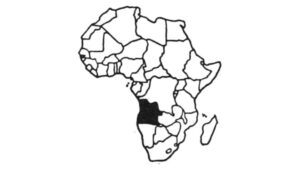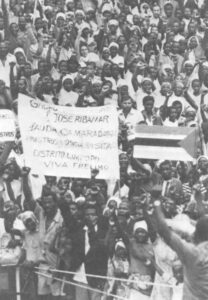Liberation forces fought a bitter ten-year guerrilla war to free Mozambique of 500 years of Portuguese domination, a goal realized with full independence for the southeast African country on June 25. But according to officials of the new government, the struggle is far from over.
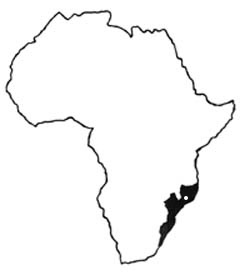 At a strangely unheralded convention of party “militants” at Mocuba in February, Frelimo, (Front for the Liberation of Mozambique) came out in strong language about the tasks before it, indicating the future is anything but rosy and that the party will have to take stiff measures to insure long-term independence in Mozambique.
At a strangely unheralded convention of party “militants” at Mocuba in February, Frelimo, (Front for the Liberation of Mozambique) came out in strong language about the tasks before it, indicating the future is anything but rosy and that the party will have to take stiff measures to insure long-term independence in Mozambique.
The convention of over 1,000 district officials — not reported fully in the local press until aid-April — was the most important meeting since the movement’s second Congress six years ago. It was a performance that revealed Frelimo as perhaps the most organized political party anywhere in Africa on the eve of an independence, with clear intentions of spreading its monopoly hold on the country’s political development.
In his keynote address, Prime Minister Joaquin Chissano revealed the party’s deep concern about the current “phase of desperate struggle between the revolutionary and reactionary forces.”
“It is a phase when the enemy already uses more subtle tactics to continue the exploitation of man by man and the oppression of the Mozambique people. This activity is quite clear through the maneuvering of certain groups doing everything to create confusion, insecurity and panic.”
“It is not only through armed attack that the enemy operates,” he continued. “Today, we have speculation in foodstuffs and other essential products, pillaging of natural resources, various forms of economic sabotage, and even acts of scorched earth.”
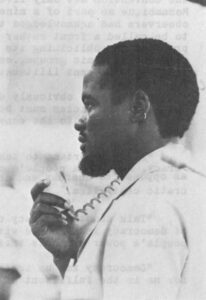 The Prime Minister said that the goal of the meeting was to confront these problems, “so when we leave here we can really proceed with the task of loyal stimulation, creating structures to prevent the infiltration in party ranks and the preparation of imperialism to sabotage the revolution.”
The Prime Minister said that the goal of the meeting was to confront these problems, “so when we leave here we can really proceed with the task of loyal stimulation, creating structures to prevent the infiltration in party ranks and the preparation of imperialism to sabotage the revolution.”
The structure Chissano referred to is a pyramid system of party committees at the national, provincial, district and local levels. At the core is the cell or circle, a small group of people gathered from either residential or work areas. A secretariat of seven — elected by members — administers the unit.
The current stage of development is the organization of “dynamic groups” for the “mentalization” of members to the policies of the party in preparation for becoming local cells or higher-level committees.
Frelimo’s main concerns, as expressed at the convention, are that the “dynamization program” is not moving fast enough and that “reactionary” elements are infiltrating the cells. The Mocuba convention accordingly recommended:
“Since the people’s power is not fully consolidated among the masses, the conversion of the dynamic groups into committees is premature. Political work is not sufficiently deeply rooted…and a lack of political cadres is evident.
“Political indoctrination and formation of dynamic groups must be intensified through the country, with special emphasis on the farm and border areas.” (Mozambique shares a long part of its border with South Africa and Rhodesia, countries with white minority governments).
Specifically, party agents will be dispatched to both rural and urban areas to form new dynamic groups. And seminars are to be set up for militants to further increase their level of political consciousness.
To insure “political purity” among members, the Mocuba delegates also recommended four steps:
- Dynamic groups will undertake investigations of anyone applying for Frelimo membership at his place of residence and work to check on past political affiliations and conduct.
- A “purge campaign” will be started to “detect, denounce and expel” infiltrators and reactionaries.
- Reports will be submitted by dynamic groups to committee headquarters as a means of checking on the correct evolution of political awareness. Also, the practices of dynamic group members will be examined to determine whether they deviate from the principles of Frelimo.
- The selection of leaders at all levels must be the responsibility of those who are confirmed “militants” and have proven their dedication to party policies.
The convention also specified just what actions are considered deviations from party policy and thus grounds for denying membership in the cells. Among them:
- Tribal tendencies, regionalism or racism.
- Arrogance of knowledge.
- Use of strikes to create economic chaos.
- Economic sabotage, such as unjustified dismissal of workers.
- Criticism outside the structures of dynamic groups.
- Destructive criticism within dynamic groups.
- Hoarding of basic commodities.
- Denial of credit to trading and industrial firms by banks or large corporations.
These are stiff measures for a party to take, considering the convention met only five months after Frelimo moved into Mozambique as part of a nine-month transition government. Foreign observers had acknowledged that the organization — which prefers to be called a front rather than a party — has made “extraordinary” progress in publicizing its aims and rallying people for participation in dynamic groups, especially since the nine million population is 80 percent illiterate and widely spread out in rural areas.
But Frelimo obviously does not agree. Complete acceptance of the front’s policies must be insured before Mozambique will be “free” according to the convention. As the Prime Minister said in his speech:
“It is important to take into account that, when we say democracy, we mean a people’s democracy under the discipline of Frelimo, as opposed to anarchy and ideological liberalism. We talk of democratic centralism.”
“Talk about democracy can compromise our policy. In the name of democracy individuals without our objective of establishing the people’s power can make their ideas prevail….”
“Democracy for us is the discipline of the party. Democracy for us is the fulfilment of national objectives.”
Frelimo is taking a firm line to insure that the incidents sparked by opposition forces last September and October, resulting in two riots in Lourenco Marques and a number of deaths, will not happen again. The means of dissent are now limited to constructive criticism within the structure of the cell or committee. And anyone openly critical of the front or its policies will not be allowed to participate.
At the moment there are no visible signs of organized opposition in Mozambique. Most leaders have fled or been retained. But Frelimo clearly wants to guarantee that there will be no opposition external or internal — to its program to politically “liberate” the nation now that the military battle is over.
Received in New York on May 19, 1975.
©1975 Robin Wright
Robin Wright is an Alicia Patterson Foundation award winner on leave from The Christian Science Monitor. This article may be published with credit to Robin Wright, The Christian Science Monitor, and the Alicia Patterson Foundation.

